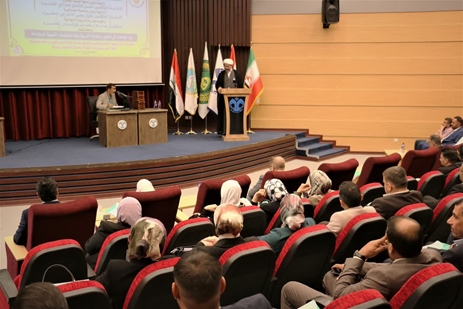The third International Scientific Conference on Social and Human Sciences, in collaboration with University of Qom and Iraqi universities, was held
The third International Scientific Conference on Social and Human Sciences, in collaboration with University of Qom and Iraqi universities, was held.

According to the press release from the Public Relations Department of Qom University, a joint conference between Qom University and Iraqi universities (Al-Qasim Al-Khadra University, Al-Hamdaniya University, Tatvir Al-Horouf Institute) was held on Sunday, 23rd of Ordibehesht (May 12, 2024), with the presence of presidents and professors from Iraqi universities.
During this session, Hojat al-Islam Dr. Sharifi, the President of Qom University, emphasized the importance of this conference in strengthening the relationship between Qom University and Iraqi universities. He stated that there are three key points regarding the role of education in the progress and excellence of society: Firstly, society is composed of a collection of small and large institutions, and the most important institutions in traditional societies are the family, economy, politics, religion, and education. However, modern societies also have other institutions such as leisure, art, media, and sports that play a significant role in shaping modern society.
He added that among these institutions, education is one of the most important and fundamental institutions in shaping society, and the strength, weakness, backwardness, development, and excellence of society and other social institutions depend on the strength, weakness, and development of the education system. The institution of education forms the structure and behavior of other social institutions, and one of the most important functions of education is to teach individual and social behaviors related to perspectives and orientations.
Dr. Sharifi explained the second point, stating that the institution of education can be progressive and influential in improving other social institutions only when it simultaneously covers all dimensions of human existence. Human beings, as the core heart of society, consist of three existential layers: perspectives, orientations, and actions. There is a mutual relationship between these three layers, and actions are influenced by orientations, while orientations are influenced by perspectives.
The President of Qom University continued that the progress and development of a human society depend on simultaneous attention to these three dimensions. Educational systems nourish perspectives, and orientations, which are human feelings, emotions, and sentiments, play a significant role in the backwardness or development of a society, and they are influenced by these perspectives. In other words, the type of perception and belief determines the direction and excellence or mediocrity of knowledge. Additionally, one of the most important functions of education is to teach individual and social behaviors related to perspectives and orientations.
Regarding the third point, he stated that the most influential perspectives shaping the social identity of individuals, which determine the development or backwardness of a society, are perspectives related to knowledge, existence, and humanity. Values, which are our understanding of these matters, form the foundation and basis of all our other understanding. A good society is one that is based on correct epistemological foundations.
The President of Qom University emphasized that the differences we observe in the orientations and actions of different individuals and societies, as well as the differences in individual and social values and humanistic goals, are all influenced by our different perspectives on the world and humanity. For example, someone who sees humans as material beings considers progress and development of a human society as a materialistic goal and regards a developed society as one with the highest level of material welfare. On the other hand, someone who believes in a divine aspect of the world and humanity and has faith in resurrection and the afterlife considers the goal of development as the divine transformation of human beings.
Dr. Sharifi continued: The ultimate result of these three points is that in order to achieve an advanced and developed society, there is no solution other than education, deepening, and strengthening the epistemological foundations of individuals. All sciences and knowledge that society's progress relies upon are based on epistemological, ontological, and anthropological foundations. If these foundations are weak, the societal foundation will also be weak, and the resulting development will not be sustainable. However, if these foundations are firm and rational, there is hope that they will bring about sustainable and enduring development.
He stated: Perhaps the secret behind the fact that the Prophet of Islam (peace be upon him) initiated his mission with education, introducing himself first as a teacher, and at the beginning of his public call, inviting people to monotheism and the negation of polytheism, and dedicating all his efforts to educating, deepening, and strengthening beliefs and convictions regarding knowledge, existence, and humanity, highlights the unparalleled role of education and upbringing in shaping society. If we aspire to continue the mission of the Prophet, we must continue this same path. A prophet-inspired society is one that is based on correct and sound epistemological foundations.
In continuation of this ceremony, Dr. Hassan Kaat al-Awadi, the President of Al-Qasim Al-Khadra University, Dr. Aqil Yahya Al-Arji, the President of Al-Hamdaniya University, and several others, expressed their gratitude to Qom University and delivered speeches. Finally, the professors and administrators of Iraqi universities were honored.
